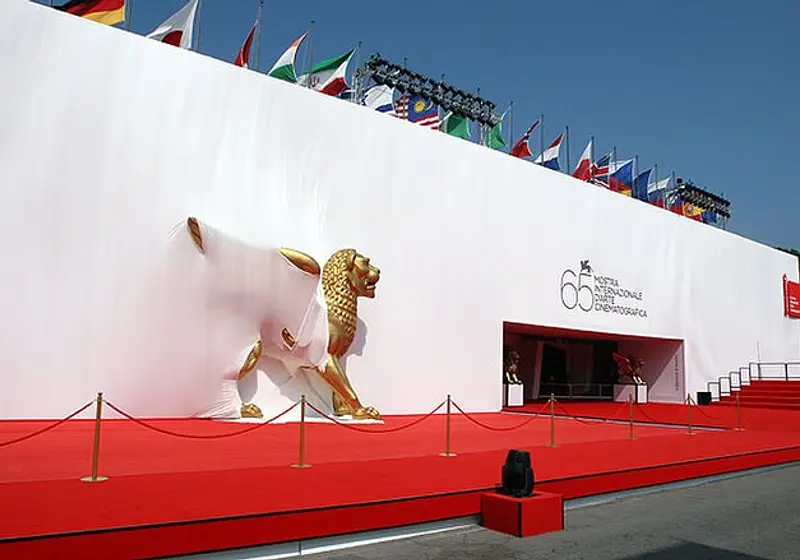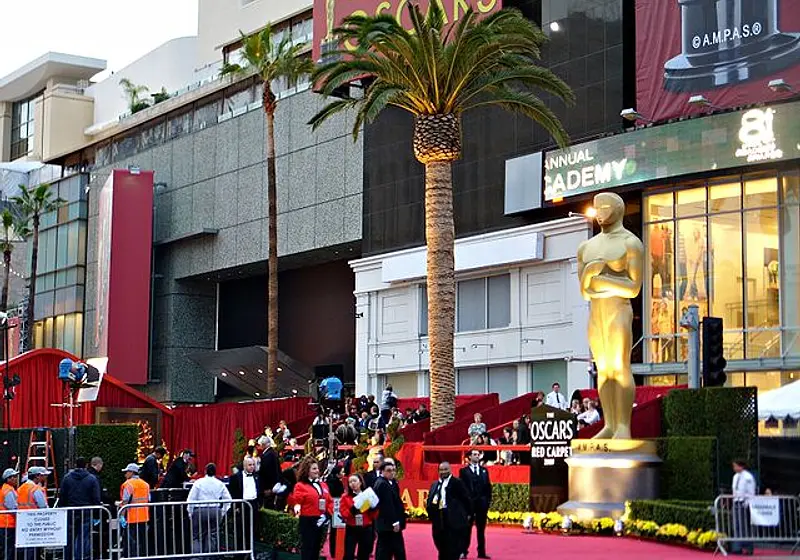In the wake of the well-known Hollywood strikes, in which both the Writer's Guild of America and the Screen Actors Guild have declared their unwillingness to continue working while massive studio corporations refuse to give them the pay they deserve, it can be easy to declare that the year in film has been ruined. Films like the massively anticipated sci-fi epic Dune: Part Two or Luca Guadagnino's spicy romantic thriller Challengers won't be coming out until next year. Movies such as the finale of the ever-hyped trilogy Spider-Man: Beyond the Spider-Verse are delayed indefinitely; some think they may never be released.
To make things worse, actors are no longer permitted to advertise or campaign their own films under the rules of the SAG-AFTRA strike, meaning it can feel to many as if the remainder of 2023 is remarkably barren when it comes to cinema they can look forward to. However, the opposite seems to be the case - in the past month, major film festivals have premiered dozens of supposedly phenomenal movies, and it is difficult to convey just how many potential hits this year's release schedule still includes.
Telluride Film Festival
Set in the breathtaking mountain splendor of Telluride, Colorado, a small town of about three thousand people that usually swells to about triple the size during its annual and titular Labor Day event, the Telluride Film Festival is a notable stop for any film's trail to critical success. This year, Telluride featured numerous movies on the receiving end of industry and audience buzz.
In particular, the Academy Awards (or Oscars) were on the minds of those discussing Telluride's biggest hits, as was the case for the other major fall film festivals. It would seem that in a world where nearly half the Academy's members are on strike, and the season's biggest juggernaut - Dune: Part Two was anticipated as a Lord of the Rings type mega-contender early in the year - has dropped out, independent darlings become all the more important.
One such film is All of Us Strangers, a film based on an obscure Japanese novel written in 1987, and directed by an equally obscure director, Andrew Haigh. The movie, a romantic fantasy with a vague plot, was not on many pundits' radar prior to its thunderous reviews coming out of Telluride, which praised the movie as the best of the decade. The site Metacritic currently has an aggregate of 98/100, which would verify this assertion.
Co-stars Andrew Scott (Sherlock) and Paul Mescal (recent Oscar nominee for Aftersun) have received rapturous acclaim. An asterisk should be attached, though, because the aforementioned Aftersun had nigh-identical reviews coming out of Cannes last year, but ended up being a film that pleased critics more than audiences... or Academy voters, who only awarded Mescal despite earlier assumptions of a more rousing success. Strangers releases in theaters December 22.
In stark contrast to All of Us Strangers, which purports to be a very layered, perhaps patrician piece of cinema, Alexander Payne's The Holdovers promises to be something that everyone can love. The film follows a curmudgeonly instructor at a prep school who must stay behind with those who have nowhere to go. Though Payne is an Academy old-timer for such contemporary classics as Sideways and The Descendants, he has never gotten Giamatti so much as a nomination, despite the two working together regularly.
With a solid 82 on Metacritic, across-the-board audience support at Telluride and now the Toronto International Film Festival (see section below), and review excerpts like Variety's - "that rare exception to the oft-heard complaint that they don’t make ’em like they used to" - it's safe to say The Holdovers is one of the biggest festival releases to watch for, in both your local theater and on the Academy stage. Holdovers releases in theaters October 27.
As for other Telluride standouts, Netflix's film about the gay civil rights leader Bayard Rustin (aptly titled Rustin) is still worthy of some attention. Colman Domingo, prolific actor in civil rights films such as Selma or Ma Rainey's Black Bottom, gives his first major lead performance in Rustin, and reviews are unanimous: Domingo is a phenomenon, and his performance is the highlight of the movie. However, with a 68 Metascore, Domingo is likely to be the only Oscar prospect.
Saltburn, the sophomore entry of writer-director Emerald Fennell, was also noted. Fennell's debut Promising Young Woman won Best Original Screenplay in 2021, but Saltburn has a divisive 59 on Metacritic; many have praised Fennell's unique vision, but the film appears avant-garde and experimental, with Barry Keoghan (The Banshees of Inisherin) appearing to be the only unequivocal point of acclaim. Rustin releases on Netflix November 17, while Saltburn does so in theaters on December 1.
Venice Film Festival
Venice, Italy is perhaps a less surprising venue than rural Colorado for a world-renowned film festival. Along with Cannes, it is one of the oldest festivals in the world. The film section dates back to 1932, but the Venice Bienalle, or overall art festival, originated in 1893, making the art that premieres here some of the most prestigious in the world. Like Telluride, many of the most anticipated films of the year premiered at Venice between August 30 and September 9, which spanned from slick thrillers to flamboyant satires.
The foremost release among the latter was likely El Conde, a Netflix film from Chile directed by Pablo Larraín (Jackie, Spencer) that depicts Augusto Pinochet, the infamous ruthless Chilean dictator, as a literal vampire sucking on the blood of his citizens. Having seen the film, its reputation for grisliness cannot be understated, with the violent satire often coming across as a gimmick, but the gothic cinematography and direction make for a stylish vision certainly worth experiencing.
The 72 Metascore reflects both its ostentatious shortcomings and elegant portrayal of parasitic fascism. El Conde was quickly released on Netflix mere weeks after its Venice debut, and is certainly worth a watch for its politics and panache.
If El Conde is the aforementioned flamboyant satire among Venice's lineup, then David Fincher's The Killer is the slick thriller. Like El Conde, The Killer is a Netflix-backed movie in the lower 70s on Metacritic, but that's about where the resemblance stops. Fincher, who audiences have likely heard of thanks to his numerous cult hits - Se7en, Fight Club, Zodiac, The Social Network, Gone Girl... one could go on.
To the shock of many, The Killer is about an assassin going about his daily tasks. The backlash to the film's simplicity ranged from accusations that the film lacks emotion to declarations that the movie has no central thesis. Despite this, Fincher seems to have made a fairly likable film, with The Guardian praising its "deadpan focus" as having "pure conviction" and being "very enjoyable." Killer streams on Netflix November 10.
David Fincher wasn't the only familiar name with a film at Venice - Bradley Cooper, director of A Star is Born and actor in Marvel's Guardians of the Galaxy films, had his new film Maestro playing. Maestro, which has a notably more creative title than Rustin, follows the relationship between renowned composer Leonard Bernstein and his wife Felicia Montealegre. Maestro made minor headlines prior to its premiere: the non-Jewish Cooper chose a prosthetic nose to depict Bernstein, a Jewish man, not to mention the fact that British actress Carey Mulligan plays a Chilean Montealagre.
However, ever since the Bernstein family released a statement condoning Cooper's portrayal, this backlash seems to have dissipated, and the film's 80 Metascore reflects shockingly positive reviews indicative of a major Oscar contender for Cooper and Mulligan. Whether Maestro's backlash reemerges, or if it is simply a solid biographical movie, has yet to be seen - it will stream on Netflix November 22.
But the biggest juggernaut of not just Venice, not just the fall film festivals, but of the entire remainder of 2023, has to be Yorgos Lanthimos' gargantuan hit Poor Things, which premiered at Venice and Telluride simultaneously, and has ridden a tidal wave of hype ever since. The 94 on Metacritic, while staggeringly high, manages to not even do the film's reviews justice - it has been labeled as triumphant, magnificent, ambitious, and overflowing with joy and passion. The trailer for Poor Things had many eyes on how it would be received - so spryly witty, so unabashedly bawdy, yet so exhilaratingly fresh and off-kilter that a unanimously positive response was widely hoped for... and yet hugely shocking when it came to fruition.
Lanthimos, known for his successful drama The Favourite, and Emma Stone, who also starred in Favourite (but is better known for films like La La Land), both seem to have created their finest work with Poor Things. Stone has been praised as perfectly cast, invigorating the hilarity that Lanthimos' unique vision requires. Both the Venice and Telluride juries selected Poor Things to win their top prize, and if one were to speculate on what will win Best Picture this year, Poor Things is the film. It releases in theaters December 8.
Toronto International Film Festival
If festivals like Venice or Cannes are the most prestigious auteurial showcases, and festivals like Telluride and Sundance showcase the widest variety of independent voices, the Toronto International Film Festival (TIFF) is unique in its populist sentiment. Though founded in 1976, making it look infantile next to Venice, Toronto boasts the largest public attendance of any film festival in the world, and its reputation for elevating top films into the Oscar race has rapidly accelerated its rise to prominence. TIFF's top award, the People's Choice Award, is unique in that every single festival attendee votes on which film should win it.
Since 2008, only one People's Choice winner has failed to be nominated for Best Picture, and the award's two runner-ups have often been closely associated with the race as well. This makes TIFF a popular stop for any film angling to enter into the conversation for the year's best, either from the perspective of Hollywood's top awards or critics' year-end analyses.
With that being said, any sane festival enthusiast was watching The Holdovers as the film to walk away as the recipient of People's Choice - Poor Things was not present in Toronto's lineup, and Holdovers' warm, jocular resonance was sure to strike a chord with TIFF audiences. But Holdovers scored runner-up, and it was instead another surprise breakout that generated headlines as the victor for People's Choice - the facetious comedy American Fiction, directorial debut of essayist Cord Jefferson and an instant hit for leading man Jeffrey Wright. Fiction follows a frustrated novelist determined to highlight the hypocrisy of Black literature, and has an agreeably wonderful 82 on Metacritic.
Its victory suggests good things - for over a decade, the People's Choice winner has become a Best Picture nominee. However, the film is backed by Metro-Goldwyn-Mayer (MGM), a studio notorious in recent years for failing to capitalize on their films' success early in the year, and thus falling short at the Academy Awards. We'll just have to see if American Fiction can break their losing streak. In theaters November 3.
The next Oscar contender - uh, I mean, potentially phenomenal feature film! - on the list of significant TIFF releases is Anatomy of a Fall, perhaps the most decorated movie at the festival owing to the fact that Anatomy didn't actually premiere in Toronto, but rather back in May at Cannes. Anatomy of a Fall, which won Cannes' top honor, the Palme d'Or, was initially looked towards as the frontrunner for Best International Feature. Since then, director Justine Triet's criticisms of the French government have resulted in France not submitting the film (yes, International Feature nominees are dependent on which film each country submits, an evidently flawed system).
However, Triet's achievements - the film's terse exploration of an unexplained death is apparently both thrilling, philosophical, and tangibly emotional, boasting an 88 on Metacritic after half a dozen separate festival premieres - are likely to be recognized. Accompanying Triet will be the film's central performer, Sandra Hüller, who delivers yet another stunning performance that has been praised for its subtle precision yet sweeping grief, and will almost certainly be a name appearing throughout the awards season. In theaters October 13.
Though perhaps not the movie making awards nerds run laps around the lawn, Hayao Miyazaki's The Boy and the Heron was by far the most widely seen film at Toronto, and is doubtlessly the most recognizable director/movie pair mentioned in this entire article. Miyazaki is widely considered to be one of the most (if not the most accomplished) animated filmmakers of all time, and is the creator behind the well-known Japanese animation company Studio Ghibli.
Toronto was Boy and the Heron's premiere in the West, after an extraordinarily minimal marketing campaign that only released the film in Japan, a choice that clearly resulted in increased intrigue rather than the opposite. And though the film allegedly is not among Miyazaki's very best - see Spirited Away, My Neighbor Totoro, and Princess Mononoke for examples of his brilliant artistic sensibilities - its 89 Metascore and historical second runner-up for the People's Choice (an animated movie has never placed at a major festival before) indicates another Miyazaki classic that American audiences can look forward to seeing in theaters December 8.
Labeled as a genre-bending masterpiece and instant Oscar frontrunner by some, called completely experimental and entirely outside of the Academy's purview by others, the superbly alienating The Zone of Interest will be our final festival release for discussion. Zone of Interest, a film by well-known experimental auteur Jonathan Glazer, follows a seemingly innocuous Nazi German family living just beyond the border of the Auchswitz concentration camp. It took home the Grand Prix at Cannes, the festival's second place prize.
Now, this evaluation of Interest as an entirely divisive film is mostly hyperbole when one glimpses its 95 on Metacritic and glowing discussion of the movie as a cerebral portrayal of hidden evil... but the "now you see me, now you don't" of awards potential has been a strange point of contention since Cannes. Initially, pundits were predicting it for upwards of seven nominations, including Best Picture, but now some claim it could be absent from the awards ceremony entirely, including Best International Feature. Hopefully, when the film releases in theaters December 8, we'll get to know more about just what makes it so uncertain in this regard.
Conclusion
In conclusion, the realm of cinema is set to dazzle audiences in the remaining months of 2023 with an exciting lineup of films that ranges from experimental arthouse films about Nazis, to polished flicks about hired killers taking down crime bosses, and so much more. These cinematic gems promise to transcend entertainment, offering profound narratives, compelling characters, and masterful storytelling. The anticipation for these festival hits is palpable, and audiences are eager to witness the magic that unfolds on the silver screen, transporting them to a realm of imagination and inspiration.
When this article's writing began, both the SAG-AFTRA and WGA strikes against Hollywood's major studios were ongoing. But since then, the Writers Guild has negotiated with the studios to end their strike, and the Screen Actors Guild has stated they hope to do the same in the near future. Movies won't be dead after 2023. Indeed, if you look closely enough, they've never been more alive.












